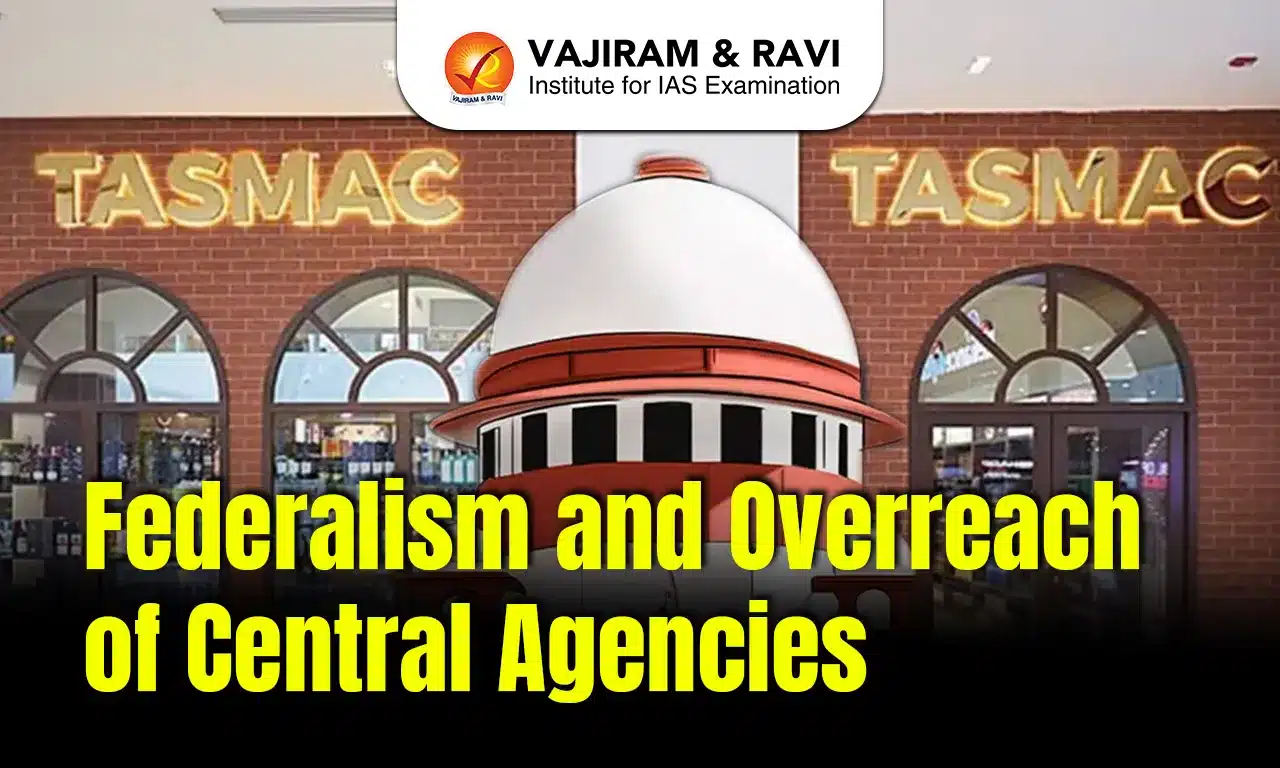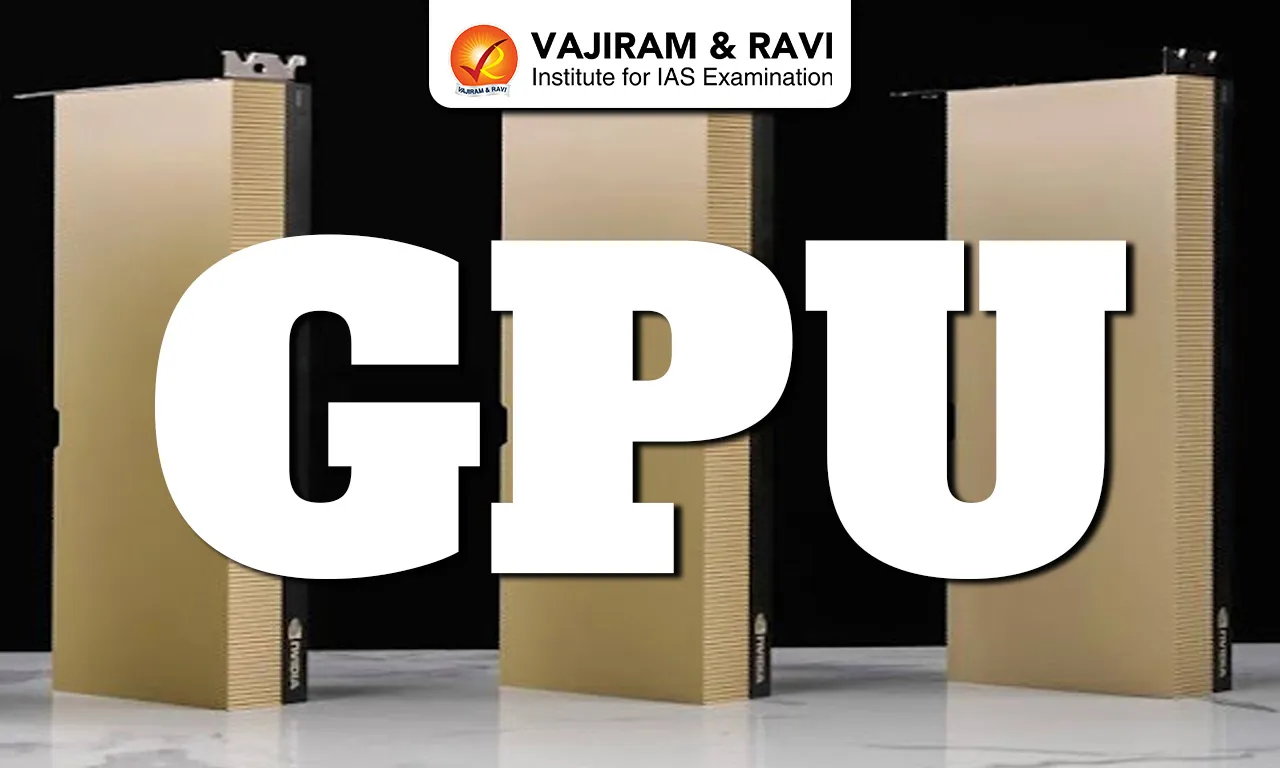Federalism and Overreach of Central Agencies Latest News
- The Supreme Court of India has stayed the Enforcement Directorate’s (ED) ongoing probe into alleged financial irregularities within the Tamil Nadu State Marketing Corporation (TASMAC), the state-run liquor monopoly.
- This is a significant development with implications for federalism, corruption investigations, and political rivalry.
SC’s Intervention
- Stay on ED proceedings:
- A two-judge bench led by Chief Justice of India B R Gavai and Justice A G Masih stayed the ED’s money laundering investigation against TASMAC.
- The court observed that ED’s actions were “violating the federal structure” and that the agency was “crossing all limits.”
- Key judicial observations:
- CJI questioned the very premise of lodging a criminal offence against a corporation.
- Criticism was directed at ED for overstepping its jurisdiction into state matters.
Background of TASMAC and ED Investigations
- TASMAC overview:
- TASMAC operates ~7,000 liquor outlets in Tamil Nadu.
- Functions as a state monopoly in alcohol retail.
- Initiation of probe:
- ED probe based on 41 FIRs by Tamil Nadu Vigilance Department (from 2014 onward).
- Allegations included corruption under the Prevention of Corruption Act, 1988.
- ED actions: Conducted searches at 20 locations including TASMAC HQ in Chennai, under the Prevention of Money Laundering Act, 2002 (PMLA).
Allegations and Findings
- Nature of allegations:
- Overcharging at outlets (Rs 10–30 per bottle).
- Kickbacks to officials by distillers for supply orders.
- Bribery in staff transfers and postings.
- Findings from ED searches:
- Incriminating data on transfer postings, transport tenders, bar licence tenders, and supplier favoritism.
- Identification of collusion involving TASMAC staff, distilleries, bottling companies, and associates.
- Tender manipulations:
- Mismatches in KYC and demand draft details.
- Single-bid tenders and allocation to applicants lacking GST/PAN/KYC compliance.
Role of Distilleries and Bottling Companies
- Financial fraud mechanism:
- Some distilleries and bottling companies allegedly involved in Rs 1,000 crore fraud.
- Fabrication of bogus purchases and inflated expenses.
- Illicit payment network:
- Distilleries routed funds through bottling companies.
- Excess payments withdrawn in cash and used for kickbacks.
- Key techniques used:
- Manipulated financial records.
- Concealed cash flows.
- Systematic evasion to generate unaccounted money.
Political and Federal Implications
- Centre-state tensions:
- DMK-led Tamil Nadu government alleges misuse of central agencies by the BJP-led Union government.
- ED probe seen as politically motivated ahead of upcoming Assembly elections.
- Federal structure debate:
- SC’s remarks raise important questions on the autonomy of states.
- Reiterates concerns over the overreach of central agencies into state jurisdictions.
- Broader political context: TN Chief Minister was critical of current Union government over issues like Hindi imposition and proposed constituency delimitation.
Conclusion
- The Supreme Court’s intervention may catalyze a redefinition of boundaries between central investigative agencies and state autonomy, reinforcing the principle of cooperative federalism.
- Going forward, ensuring transparency in public sector undertakings like TASMAC will be crucial to restoring public trust and preventing the misuse of institutional powers for political ends.
Federalism and Overreach of Central Agencies FAQs
Q1. Discuss the constitutional implications of the Supreme Court’s criticism of the ED’s actions in the TASMAC case.
Ans. The Supreme Court’s observation that the ED is “violating the federal structure” highlights concerns of institutional overreach by central agencies into the domain of state governance, undermining cooperative federalism.
Q2. What legal provisions are central to the ED’s investigation into TASMAC, and how do they intersect with corruption allegations?
Ans. The ED’s probe is based on the Prevention of Money Laundering Act, 2002 (PMLA), arising from FIRs under the Prevention of Corruption Act, 1988, linking corruption to laundering of illicit financial gains.
Q3. Explain how the TASMAC case illustrates the challenges of ensuring transparency in public sector tenders.
Ans. The case reveals irregularities like single-bid awards, KYC mismatches, and fictitious documentation, pointing to systemic flaws in tendering and accountability in public sector enterprises.
Q4. Evaluate the political dimensions of ED investigations in states governed by opposition parties, using the TASMAC case as an example.
Ans. The ED probe against TASMAC, amid political rivalry between DMK and BJP, raises questions of selective targeting and politicisation of investigative agencies in a federal democracy.
Q5. What role did distilleries and bottling companies play in the alleged financial fraud involving TASMAC?
Ans. Distilleries and bottling companies allegedly colluded to inflate expenses and create fake transactions to generate over ₹1,000 crore in unaccounted cash used for kickbacks and illicit benefits.
Last updated on February, 2026
→ UPSC Notification 2026 is now out on the official website at upsconline.nic.in.
→ UPSC IFoS Notification 2026 is now out on the official website at upsconline.nic.in.
→ UPSC Calendar 2026 has been released.
→ UPSC Final Result 2025 is expected to be released in the second week of April 2026.
→ Check out the latest UPSC Syllabus 2026 here.
→ Join Vajiram & Ravi’s Interview Guidance Programme for expert help to crack your final UPSC stage.
→ UPSC Mains Result 2025 is now out.
→ UPSC Prelims 2026 will be conducted on 24th May, 2026 & UPSC Mains 2026 will be conducted on 21st August 2026.
→ The UPSC Selection Process is of 3 stages-Prelims, Mains and Interview.
→ Prepare effectively with Vajiram & Ravi’s UPSC Prelims Test Series 2026 featuring full-length mock tests, detailed solutions, and performance analysis.
→ Enroll in Vajiram & Ravi’s UPSC Mains Test Series 2026 for structured answer writing practice, expert evaluation, and exam-oriented feedback.
→ Join Vajiram & Ravi’s Best UPSC Mentorship Program for personalized guidance, strategy planning, and one-to-one support from experienced mentors.
→ Check UPSC Marksheet 2024 Here.
→ UPSC Toppers List 2024 is released now. Shakti Dubey is UPSC AIR 1 2024 Topper.
→ Also check Best UPSC Coaching in India
Tags: federalism and overreach of central agencies mains articles upsc current affairs upsc mains current affairs




















